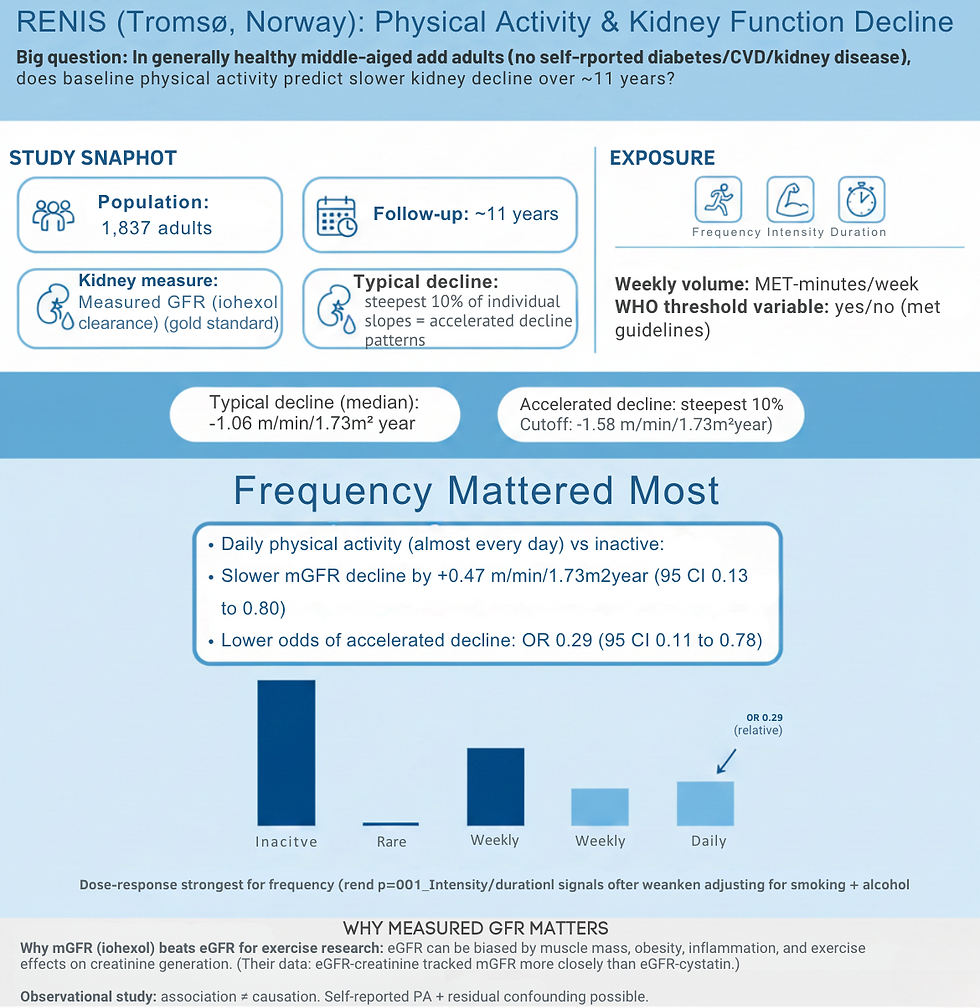☀️ Vitamin D and Kidney Disease: What You Need to Know
- Carly Valencia-Ochoa, MD

- Nov 8, 2025
- 4 min read
Carla Valencia, MD
Introduction
Vitamin D is not just for strong bones, it helps many parts of the body, including the kidneys. For individuals with CKD, maintaining a balanced vitamin D level is particularly crucial. This guide explains why vitamin D is important, the different types of vitamin D, when and how doctors may treat low vitamin D levels, and what the research says.
🌟 What does vitamin D do in the body?
• Helps the body use calcium and phosphorus for strong bones.
• Helps regulate the parathyroid hormone (PTH), which influences bone health and mineral balance.
• May reduce inflammation and protect kidney tissue in some studies (research is ongoing).
🧾 Types of vitamin D
1. Cholecalciferol (vitamin D₃): The common supplement made in the skin from sunlight and found in some foods. It raises 25-hydroxyvitamin D (25-OH D).
2. Ergocalciferol (vitamin D₂): Another nutritional supplement form you can take by mouth.
3. Calcifediol (25-hydroxyvitamin D, also called 25(OH)D or calcidiol): The type of Vit D that is measured during routine blood tests. Some pills (or extended release forms) can raise levels faster and more steadily.
4. Calcitriol and vitamin D analogs (active forms: 1,25-(OH)₂D): These are the active hormone forms used by doctors for specific and advanced CKD problems. They work without needing the kidney to activate the vitamin D, but they carry a higher risk of increasing calcium or phosphorus levels when used too aggressively.
🩺 Why vitamin D matters in CKD?
• CKD patients commonly have low 25-OH vitamin D (vitamin D deficiency) due to reduced sun exposure, dietary changes, and other factors. Low vitamin D is linked to worse bone health, higher PTH, and may be tied to higher illness in some studies.
• Low vitamin D can worsen CKD-mineral and bone disorder (CKD-MBD) a set of problems with bones, calcium, phosphate, and PTH. Managing vitamin D is part of preventing CKD-MBD.
🔍 Do doctors test vitamin D in CKD?
Yes: Doctors usually measure 25-hydroxyvitamin D (25-OH D) with a blood test when they worry about bone health or mineral problems. KDIGO and other kidney groups suggest checking 25-OH D and treating deficiency as needed. The exact testing frequency depends on the results and the stage of CKD...advanced CKD notes more frequent checking
✅ When is vitamin D supplementation recommended?
• If 25-OH D is low (deficiency or insufficiency), most kidney experts recommend giving nutritional vitamin D (cholecalciferol or ergocalciferol) to correct the low level, especially in earlier CKD (stages 1–3) and in many patients with stages 3–4.
• Suppose PTH is high despite normal 25-OH D levels. In that case, doctors may consider active vitamin D (calcitriol) or vitamin D analogs. However, this is a specialist decision because these drugs can increase calcium and phosphorus levels.
• In advanced CKD (stage 5 or dialysis), treatment choices need careful monitoring (blood calcium, phosphate, and PTH). Some newer forms (like extended-release calcifediol) may be useful in selected patients.
⚖️ Benefits and Cautions (what the evidence shows)
• Benefits: Treating vitamin D deficiency helps bone health and lowers PTH in many patients. Observational studies also link adequate vitamin D to better outcomes.
• Uncertainty: Randomized trials have not proved that routine vitamin D supplementation reduces death or CKD progression for every patient. Guidelines therefore recommend correcting the deficiency, but do not recommend routine high-dose therapy for everyone without monitoring.
• Risks: Active vitamin D and some analogs can increase blood calcium and phosphate levels, potentially harming blood vessels and bones if not closely monitored. That is why doctors regularly check labs.
🥗 How to keep vitamin D healthy naturally (if your doctor says it’s safe)
• Sensible sun exposure (short, safe time in the sun) can help.
• Foods: fatty fish (salmon), fortified milk, eggs (yolk), some mushrooms — but diet alone may be insufficient for many CKD patients.
• Always check with your doctor before taking over-the-counter vitamin D, especially in CKD.

❤️ Bottom line
• Vitamin D is important for bone, mineral, and possibly kidney health in CKD.
• Test first. Don’t start supplements on your own. Check 25-OH vitamin D and other labs.
• Replace low 25-OH D with nutritional vitamin D when indicated (cholecalciferol/ergocalciferol or sometimes calcifediol). Use active vitamin D carefully under a doctor’s supervision for high PTH levels.
📚 References
1. KDIGO Clinical Practice Guideline Update for CKD-MBD (2017). KDIGO recommends measuring 25-OH vitamin D and correcting deficiency as part of CKD-MBD care.
2. NKF-KDOQI Controversies Report: 25-Hydroxyvitamin D Testing and Supplementation in CKD. National Kidney Foundation discussion of thresholds and controversies.
3. Vervloet MG. Vitamin D supplementation in people with chronic kidney disease. Kidney International, 2023 (review of evidence and remaining uncertainties).
4. Yeung WCG et al. Vitamin D therapy in chronic kidney disease. (2024 review summarizing evidence and recommendations).
5. Germain MJ et al. Real-world assessment: extended-release calcifediol and safety/effectiveness (2022). Discusses newer calcifediol formulations used in CKD.




Comments